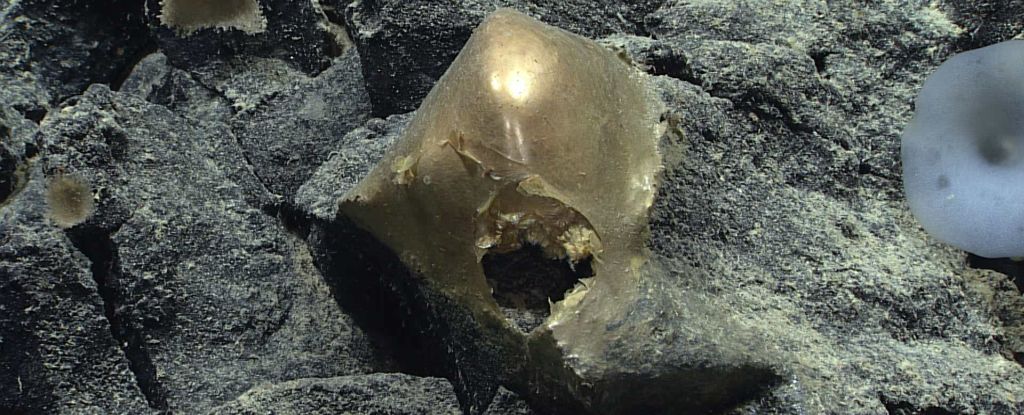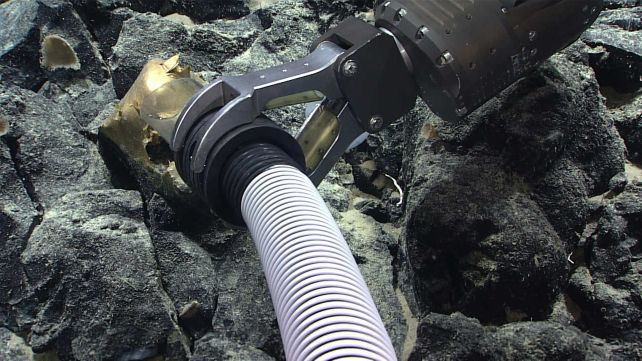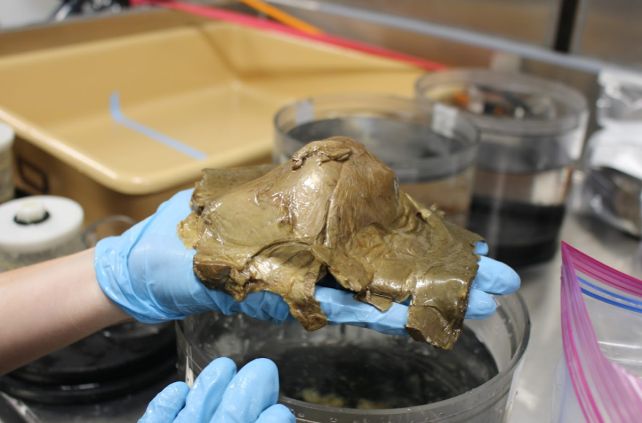
At approximately 3,300 meters (2 miles) beneath the surface off the coast of Alaska, in a region untouched by the Sun’s warm light, a peculiar golden orb was discovered by an NOAA Ocean Exploration remotely operated underwater vehicle.
The orb was firmly attached to a rock adorned with white sponges, measuring approximately 10 centimeters (4 inches) across and featuring a hole on one side.
The nature of the enigmatic orb remained uncertain. Preliminary ideas from the researchers overseeing the live dive stream ranged from it being an egg casing of an unknown species to a deceased sponge or coral.
I don’t know what to make of that,
said one of the researchers on the livestream last year.
It’s definitely got a big old hole in it, so something either tried to get in or tried to get out,
another speculated.
I just hope when we poke it, something doesn’t decide to come out,
one researcher said. It’s like the beginning of a horror movie.
Whatever ominous entity this may be, it appears to be in an early stage of development. As per The Guardian reports, scientists hypothesize that something substantial may have emerged from the golden casing—something not precisely diminutive.
We’re going with egg because of the texture. It felt fleshy and it doesn’t have any obvious anatomy. It has a hole in it that suggests something has come in or gone out. But it doesn’t look like any egg I’ve ever seen,
deep-sea ecologist Kerry Howell of the University of Plymouth in the UK told the paper.
If it is an egg, the really interesting question is whose egg is it. It’s quite big. That’s not a small fish egg. That’s a sizable thing.
With the assistance of a robotic arm, the scientists delicately prodded the object, confirming its soft nature, and subsequently collected it through suction for additional examination. DNA analysis is planned to identify the organism accountable for its formation.

The solitary presence of the ‘egg’ is as fascinating as its size. Normally, oviparous animals lay eggs in groups or clutches.
If indeed the object is an egg, it possesses an unusual quality. This is truly intriguing as the orb has something novel to reveal about the deep ocean and the diverse life flourishing within it.
The hostile depths of the ocean hold many enigmas yet to be unraveled. Harsh pressures and freezing temperatures have limited human exploration. Nevertheless, through the use of remotely operated vehicles as surrogates, the ocean is slowly unveiling its mysteries, shedding light on the reproductive methods of elusive deep-sea species.

Isn’t the deep sea so delightfully strange?
said exploration coordinator Sam Candio of NOAA Ocean Exploration.
Although we successfully retrieved the ‘golden orb’ and brought it aboard the ship, we are still unable to identify it beyond confirming its biological origin. Further insights are expected to emerge when we can analyze it in a laboratory setting, leveraging the expertise of the scientific community and employing more advanced tools than those available on the ship.
While somewhat humbling to be stumped by this finding, it serves as a reminder of how little we know about our own planet and how much is left to learn and appreciate about our ocean.
This article’s initial version was released in September 2023.





